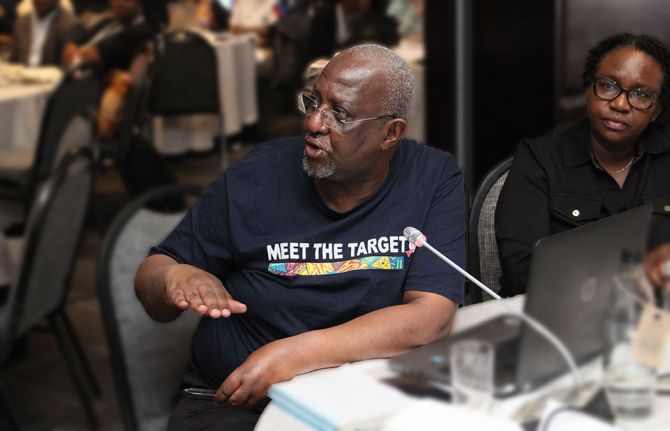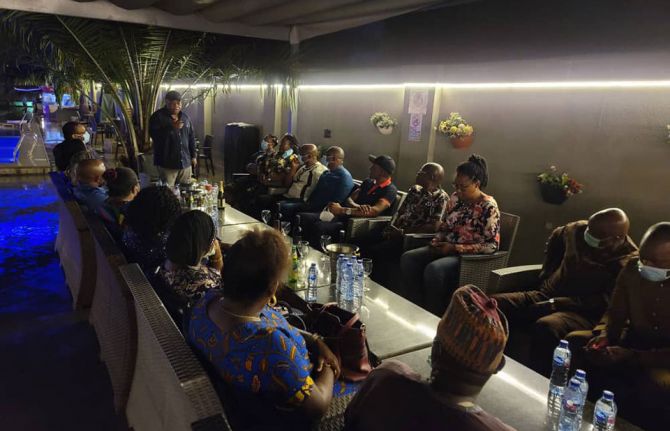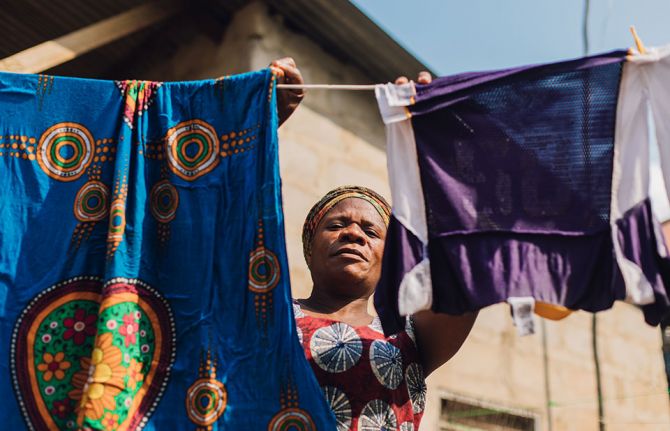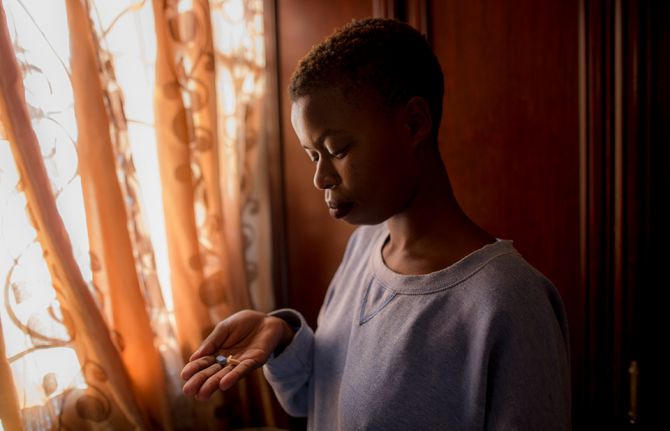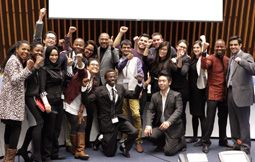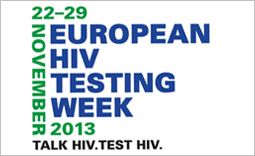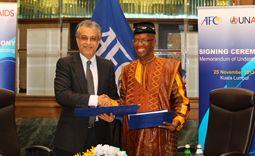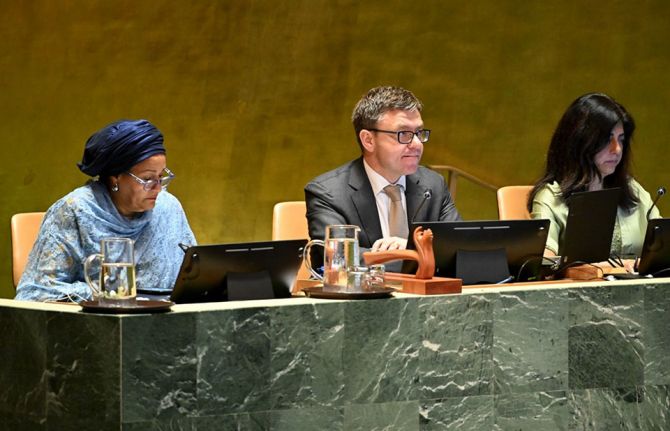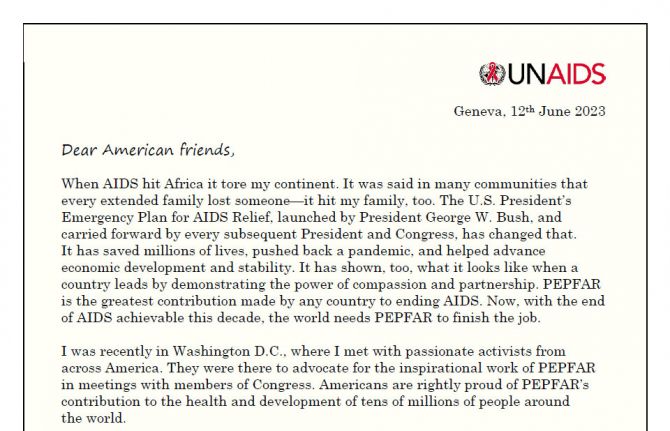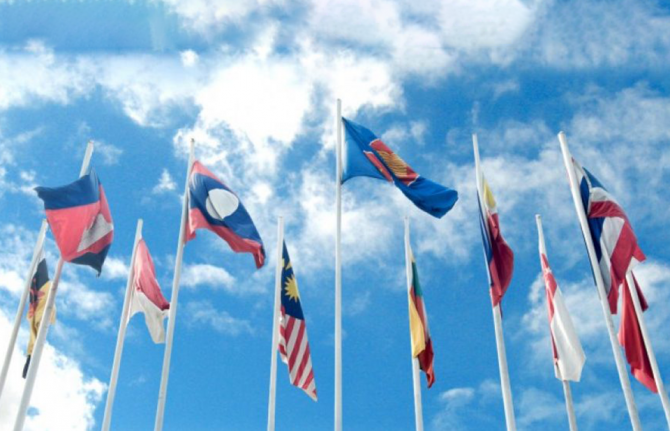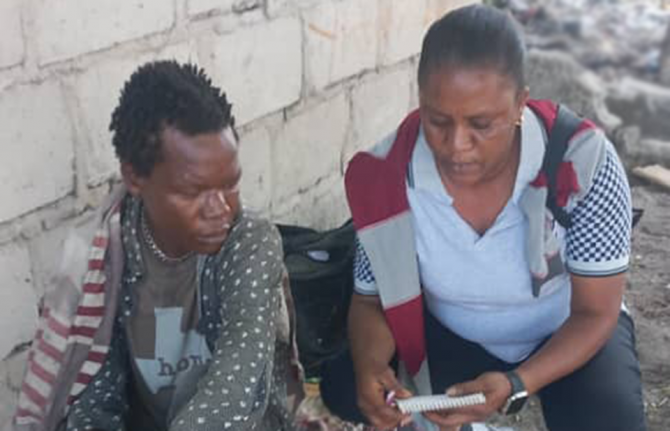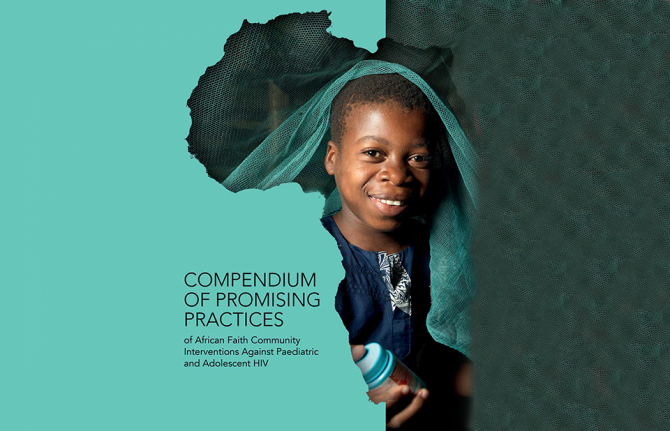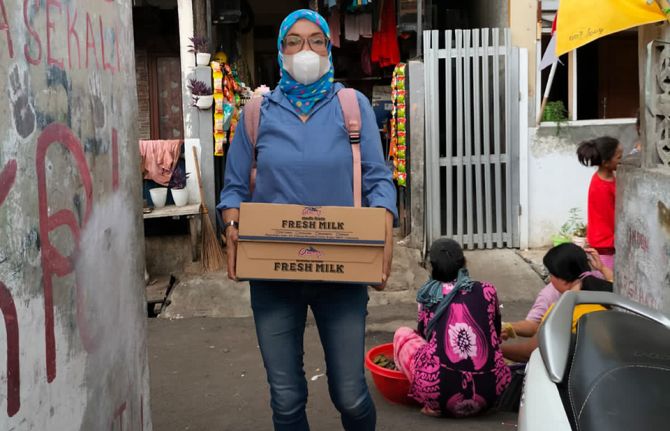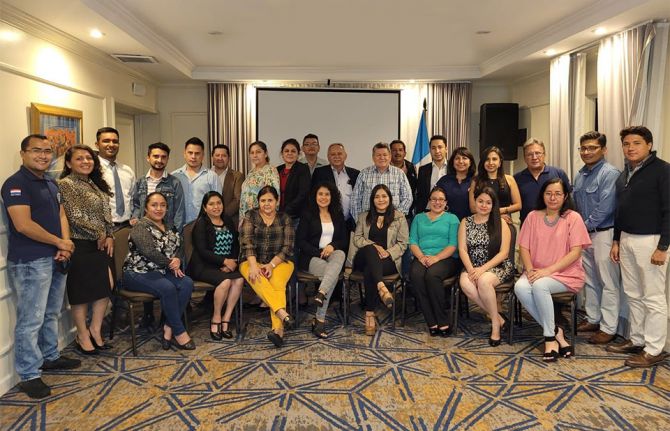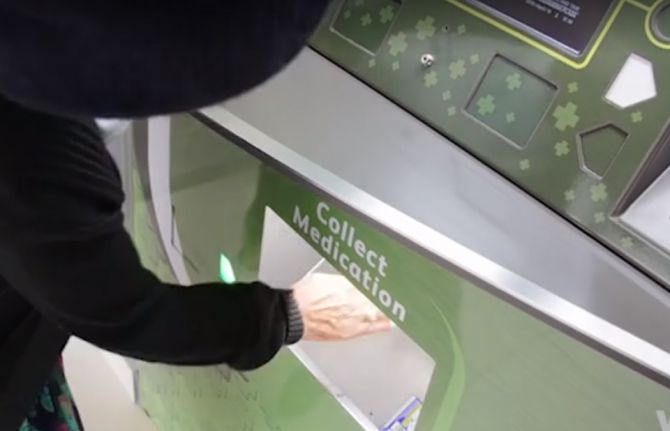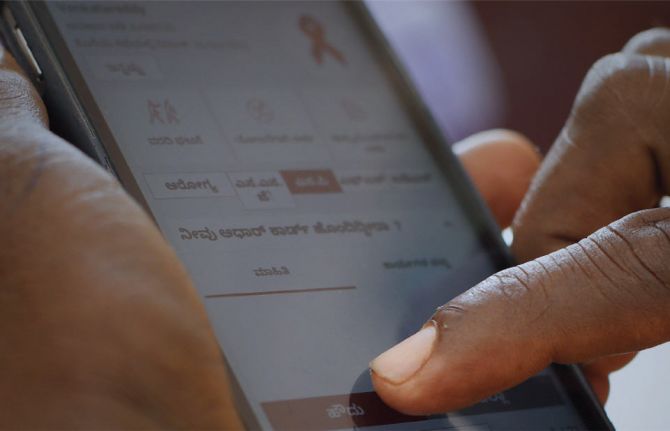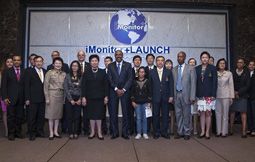
Feature Story
Panel discussion 5: Resources and Universal Access
09 June 2008
09 June 2008 09 June 2008The final discussion panel of 2008 High-level meeting on AIDS will examine aspects of financing the response to AIDS, including sources of funding, resource allocation, and spending, “making the money work”, accountability and predictable and multi-year funding.
The panel will consider specific steps which can be taken to ensure predictable funding into the future, from all sources, without imposing excessive burdens on poor nations and the poorest communities.
This panel will be broadcast via live internet webcast at 19:00 GMT
Current situation
Responding to the call for increased resources to support the global AIDS response in 2001, new initiatives by multilateral institutions such as the World Bank’s Africa Multi-Country HIV/AIDS Program and by bilateral donors, such as the United States President’s Emergency Plan for AIDS Relief (PEPFAR) were launched to mobilize international resources in response to the spread of the AIDS epidemic.
The Global Fund to Fight AIDS, Tuberculosis and Malaria was established to provide low- and middle-income countries with additional financing. Prices of some AIDS medicines have been greatly reduced and now millions of people are on antiretroviral treatment.
|
Questions to be discussed:
|
The Chair of this panel is H.E. Mr. Gudlaugur Thor Thordarson, Minister of Health (Iceland); and panelists are H.E. Mr. Daniel Kwelagobe, Minister, Presidential Affairs and Public Administration (Botswana), Mr. Vladimir Zhovtyak of Eastern European and Central Asian Union of People Living with HIV/AIDS (Ukraine), Mr. Michel Kazatchkine, Executive Director, Global Fund to fight AIDS, Tuberculosis and Malaria.
The Chair’s summary of this discussion will be published after the event, please check back to access it.
Panel discussion 5: Resources and Universal Acces
External links:
2008 High Level Meeting on AIDS official web site
Feature stories:
Much progress to report: UNGASS 2008 (12 March 2008)
UN General Assembly meets on AIDS (22 May 2007)
Publications:
UN Secretary-General’s progress report on AIDS ( en | fr | es | ru | ar | ch )
2001 Declaration of commitment on HIV/AIDS (pdf, 1.84 Mb)

Feature Story
Panel discussion 2: Providing leadership in countries with concentrated epidemics
09 June 2008
09 June 2008 09 June 2008In many countries, the people who are most in need of HIV prevention, treatment, care and support are not able to reach these services as they are already vulnerable and stigmatized in society.
On 10 June, as part of 2008 High-Level meeting on AIDS, a discussion panel will look at how the obstacles preventing everyone—especially those who are seen as being on the margins of society—having access to services can be removed.
Panelists will consider actions which can be taken by countries with concentrated epidemics to increase the political will and leadership to address the main barriers to access HIV prevention, treatment, care and support services.
This panel will be broadcast live via internet webcast at 20:30 GMT
Concentrated epidemics
In many regions of the world, including Europe, Asia, Latin America and West Africa, most countries are experiencing concentrated HIV epidemics where HIV has spread rapidly in one or more defined subpopulations but is not well-established in the general population.
Due to a combination of biological and behavioural factors, some people are at higher risk of acquiring and/or transmitting HIV, including sex workers and their clients; people who inject drugs; men who have sex with men; and people in prison settings.
Others, including those already with sexually transmitted infections, migrant workers who spend long periods away from their partners, uniformed services personnel and ethnic minorities may also be more likely to be exposed to HIV, depending on the local situation.
It has been shown that concentrated HIV epidemics can be prevented, stabilized and even reversed using a comprehensive programme of HIV prevention, treatment, care and support activities.
Current situation
The 2008 Secretary-General’s Report on the Declaration of Commitment on HIV/AIDS and the 2001 Political Declaration on HIV/AIDS show some progress but many remaining challenges. For example, more than 80% of all HIV infections in Eastern Europe and Central Asia are due to the use of contaminated injection equipment.
Also only around one third of reporting countries have protection against discrimination for sex workers, men who have sex with men and people who inject drugs.
In half of all reporting countries there are laws or policies which actually impede access by the most-at-risk populations to HIV prevention, treatment, care and support.
|
Questions to be discussed:
|
The panel is composed of H.E. Mr. Elias Antonio Saca Gonzales, President (El Salvador); H.E. Ms. Rigmor Aasrud, State Secretary of Health and Care Services (Norway); Ms. Sonal Mehta of India HIV/AIDS Alliance (India); Mr Antonio Maria Costa, Executive Director, United Nations Office on Drugs and Crime (UNODC).
The Chair’s summary of this discussion will be published after the event, please check back to access it.
Panel discussion 2: Providing leadership in count
External links:
2008 High Level Meeting on AIDS official web site
Feature stories:
UNFPA: Bringing HIV services directly to communities in Côte d'Ivoire (21 April 2008)
Publications:
UN Secretary-General’s progress report on AIDS ( en | fr | es | ru | ar | ch )
2001 Declaration of commitment on HIV/AIDS (pdf, 1.84 Mb)

Feature Story
Panel discussion 4: Providing a robust and long term response to AIDS
09 June 2008
09 June 2008 09 June 2008The fourth panel discussion of the 2008 High-level meeting on AIDS is set to examine the multigenerational challenge of the AIDS response.
Many factors from poverty to tuberculosis are proving to be obstacles to a long term response to AIDS in some instances turning back advances already gained. The efforts that will be required over future generations depend on actions taken now.
The response to AIDS requires long-term investment in strengthening health systems. More research and investments are also required, while scaling up of proven and effective HIV prevention tools and strategies is urgent. Social protection for the most vulnerable populations must remain a priority.
This panel will be broadcast live via internet webcast at 15:30 GMT
The panel will consider specific actions on how progress towards reversing the HIV epidemic is central to meeting the Millennium Development Goals; how to help mitigate the impact of HIV on families and communities; how HIV responses that integrate tuberculosis prevention and treatment programmes can help address the challenges of these co-infections; the need for health system strengthening to improve the range of chronic health systems problems; and how scientific research remains vital for securing the future.
|
Questions:
|
This discussion “AIDS: A Multigenerational Challenge – Providing a Robust and Long-Term Response” will be chaired by H.E. Dr. Tabita Botros Shokai, Minister of Health (Republic of the Sudan) and the panelists are H. E. Ms. Maret Maripuu, Minister of Social Affairs (Estonia); Mr. Gregg Gonsalves (US), Global Network of People Living with HIV/AIDS (GNP+); Ms. Ann Veneman, Executive Director, United Nations Children’s Fund (UNICEF).
The Chair’s summary of this discussion will be published after the event, please check back to access it.
Panel discussion 4: Providing a robust and long t
External links:
2008 High Level Meeting on AIDS official web site
Feature stories:
Much progress to report: UNGASS 2008 (12 March 2008)
UN General Assembly meets on AIDS (22 May 2007)
Publications:
UN Secretary-General’s progress report on AIDS ( en | fr | es | ru | ar | ch )
2001 Declaration of commitment on HIV/AIDS (pdf, 1.84 Mb)
Related

Feature Story
Panel discussion 3: Gender equality and AIDS
09 June 2008
09 June 2008 09 June 2008The first panel discussion on the second day of the 2008 High-Level meeting on AIDS is on the topic of gender equality and AIDS.
This panel will be broadcast live via internet webcast at 14:00 GMT
Overview
Globally, women comprised half of adults living with HIV in 2007 and in sub-Saharan Africa, 61% of people living with HIV are women.
A range of biological, cultural and economic factors make women vulnerable to HIV and disproportionately burden them with the epidemic’s impact. Vulnerability can start even before women become adults as many girls under the age of 18 experience early sexual initiation, unsafe sex, early marriage and widespread sexual exploitation and violence.
The widely-held beliefs, expectations, customs and practices within a society that define ‘masculine’ and ‘feminine’ attributes, behaviours and roles and responsibilities lead to gender inequality. This inequality often results in women and girls having less access to education, health services and income-earning opportunities than men and boys.
Women and girls also are the main providers of care and support to household members with AIDS.
Current situation
Government commitments in the 2001 Declaration of Commitment on HIV/AIDS and in the 2006 Political Declaration on HIV/AIDS acknowledged that HIV services and programmes reaching women and girls need to be scaled up if the course of the epidemic is to be reversed.
However, much still needs to be done. For example, only 34% of women living with HIV are provided with antiretroviral treatment to prevent mother-to-child transmission, far below the 80% target.
Women’s participation in decision-making helps make HIV services and programmes more sensitive to gender inequalities however opportunities are often limited and they are often absent from dialogues that shape global and national AIDS policies and programmes.
Some specific actions that may make a difference include: the importance of cross-sectoral national strategies that reach beyond health to include social and economic empowerment; prioritizing young women and girls’ access to HIV prevention and other sexual and reproductive health services; inclusion of HIV-positive women in the planning and design of AIDS policies and programmes.
|
Questions to be discussed:
|
The Chair of this discussion is Ms. Anna Marzec–Boguslawska, Head of the National AIDS Centre (Poland) and the panelists are H.E. Mr. Francisco Duque III, Minister of Health (Philippines); Ms. Rosa González (Honduras), LACASSO - ICASO3; Ms. Thoraya Obaid, Executive Director, United Nations Population Fund (UNFPA).
The Chair’s summary of this discussion will be published after the event, please check back to access it.
Panel discussion 3: Gender equality and AIDS
External links:
2008 High Level Meeting on AIDS official web site
Feature stories:
Much progress to report: UNGASS 2008 (12 March 2008)
UN General Assembly meets on AIDS (22 May 2007)
Publications:
UN Secretary-General’s progress report on AIDS ( en | fr | es | ru | ar | ch )
2001 Declaration of commitment on HIV/AIDS (pdf, 1.84 Mb)

Feature Story
First HIV/TB Global Leaders Forum
09 June 2008
09 June 2008 09 June 2008
The Global Leaders Forum is supported by
UNAIDS, the World Bank, WHO, the Global
Fund to Fight AIDS Tuberculosis and
Malaria and the Stop TB Partnership who
are the co-sponsors of the initiative.
The first HIV/TB Global Leaders' Forum will be held on 9 June 2008 at the United Nations in New York and will bring together heads of government, public health and business leaders, heads of UN agencies and activists.
The meeting, endorsed by the UN Secretary General, Mr Ban Ki-moon, will be held on the eve of the UN General Assembly High-level Meeting on AIDS taking place 10-11 June 2008.
Speakers, who include UNAIDS Executive Director Dr Peter Piot and WHO Director General Dr Margaret Chan, will discuss the health, socio-economic and human security impacts of the TB and HIV joint epidemics and call for opportunities for bold leadership and col¬laboration to ensure an effective response to TB and HIV.
TB and HIV: a lethal combination
TB is the leading infectious killer of people living with HIV, and accounts for the deaths of an estimated a quarter of million people living with HIV each year AIDS. It is the number one cause of death among people living with HIV in Africa. Since most TB deaths are among adults of working age HIV/TB coinfection risks being a major constraint to economic development.
HIV and TB are so closely connected that they are often referred to as co-epidemics or dual epidemics that drive and reinforce one another: HIV activates dormant TB in a person, who then becomes infectious and able to spread the TB bacillus to others.
Recently new TB strains, extensively drug resistant TB (XDR TB), have emerged, which are particularly lethal as they are virtually untreatable using currently available anti-TB drugs. Greater investment in TB services, improved community case finding and adherence support, and more effective infection control are essential in preventing the development and spread of drug resistant TB.
In addition, the drugs, diagnostics and vaccines currently available are not appropriate for people with HIV/TB co-infection and so new tools are needed that work in the presence of coinfection.
The Global Leaders Forum is supported by UNAIDS, the World Bank, WHO, the Global Fund to Fight AIDS Tuberculosis and Malaria and the Stop TB Partnership who are the co-sponsors of the initiative.
It is expected that the Forum, will produce a Call for Action to drastically cut the number of deaths associated with HIV/TB co-infection and the outcomes of the event will be reported to the UN High-Level Meeting on AIDS.
First HIV/TB Global Leaders Forum
Cosponsors:
Partners:
External links:
Related

Feature Story
2008 High-Level meeting on AIDS panel discussions
09 June 2008
09 June 2008 09 June 2008The 2008 High-Level meeting on AIDS begins 10 June at the General Assembly in New York. In addition to the plenary meetings, a series of panel discussions will be held over the next two days.
These discussions will cover a range of topics from gender equality to concentrated epidemics and the multigenerational challenge of AIDS. The discussions will be open to representatives of Member States, observers and civil society representatives and presentations will be followed by an interactive dialogue.
The panels will also be broadcast live via internet webcast.
Panel 1: Building on results and accelerating progress towards universal access
During the 2006 High Level Meeting on HIV/AIDS, countries committed to set ambitious national targets for scaling up towards universal access to HIV prevention, treatment, care and support by 2010.
The 2008 Secretary-General’s Report on the Declaration of Commitment on HIV/AIDS and Political Declaration on HIV/AIDS confirms that countries have used the universal access process as a catalyst to accelerate their national AIDS responses. Examining findings from the national progress reports, the panel will look at results as well as the gaps and will identify actions that should be taken at country, regional and global levels.
Improving national leadership and coordination
Countries that have made good progress towards achieving universal access have shown strong political leadership and coordination of the AIDS response. The panel will explore possible catalysts that could enhance political will in countries with less engaged leadership and weaker coordination mechanisms.
Addressing obstacles
The 2008 reports submitted by 147 countries to UNAIDS, in compliance with the 2001 Declaration of Commitment on HIV/AIDS, indicate that progress has been achieved when national AIDS strategies identified and unblocked obstacles including health systems strengthening, affordable commodities, sustainable financing, stigma and discrimination and lack of integration of HIV into other health services.
|
Questions to be discussed:
|
The Chair of this discussion will be H. E. Mr. Nimal Siripala De Silva, Minister of Healthcare and Nutrition (Sri Lanka)and the panelists are H.E. Ms. Nilcéa Sreire, Minister of Women’s Affairs (Brazil); Dr Lydia Mungherera of The AIDS Service Organisation (TASO)(Uganda) and Dr Margaret Chan, Director General, World Health Organization (WHO)
The Chair’s summary of this discussion will be published after the event, please check back to access it.
2008 High-Level meeting on AIDS panel discussions
External links:
2008 High Level Meeting on AIDS official web site
Feature stories:
Much progress to report: UNGASS 2008 (12 March 2008)
UN General Assembly meets on AIDS (22 May 2007)
Publications:
UN Secretary-General’s progress report on AIDS ( en | fr | es | ru | ar | ch )
2001 Declaration of commitment on HIV/AIDS (pdf, 1.84 Mb)
Related

Feature Story
UNAIDS response to “Reassessing HIV Prevention”
06 June 2008
06 June 2008 06 June 2008“Only” doesn’t work for HIV prevention.
UNAIDS advocates that countries implement HIV prevention programmes that will be truly effective in reducing new HIV infections. This requires a strategic combination of interventions that address populations that are at risk or vulnerable for transmission and that utilize behavioral and social change methods that are appropriate and informed by the latest evidence.
The word “only” doesn’t work for AIDS—whether it’s for treatment only, HIV prevention only, condoms only, abstinence only or male circumcision only. In reality we need it all—a truly comprehensive approach. For UNAIDS, the three pillars of a comprehensive and effective AIDS response, as we move towards universal access, are HIV prevention, treatment and care and support.
Since its establishment in 1996, UNAIDS has supported comprehensive approaches to HIV prevention, applying a combination of strategies that respond to actual needs. Countries should determine the right combination of HIV prevention interventions through an analysis of the current epidemic and the state of the national response. Part of this analysis should include an understanding of the effectiveness in the relevant populations and settings. This approach was endorsed by the member states when they adopted the UNAIDS policy position paper on intensifying HIV prevention in June 2005.
Recently in a Policy Forum article in Science, Dr. Malcolm Potts and nine colleagues call for “Reassessing HIV Prevention.” UNAIDS definitely agrees that programmes should undergo regular monitoring and evaluation of impact, but we disagree on the narrow prescriptions that these authors provide. These include their interpretations of the linkages of HIV and poverty, the effectiveness of condoms and HIV testing and counseling as HIV prevention tools, the need to prioritize male circumcision and the reduction of sexual partners, at the expense of other HIV prevention programmes. We also wish to clarify UNAIDS’ assessment of resource needs for HIV prevention in countries with generalized HIV epidemics.
Read full UNAIDS response (pdf, 32.8 Kb)UNAIDS response to “Reassessing HIV Prevention”
Publications:
Intensifying HIV Prevention: UNAIDS Policy Position Paper (pdf, 3.8 Mb)
Practical Guidelines for Intensifying HIV Prevention (pdf, 3.3 Mb)

Feature Story
AIDS to feature at the Jackson Hole Film Festival
06 June 2008
06 June 2008 06 June 2008
The annual Jackson Hole Film festival
(JHFF) begins on 6 June in Wyoming,
United States of America.
This leading independent film festival has always been committed to creating a platform for global inspiration and change. In this, it’s fifth year, it is inviting senior UN officials to discuss ways to engage the world on neglected issues with media figures and members of the film industry.
In addition to the screening of 100 independent films and documentaries, the Festival is hosting the first Global Insight summit in partnership with the United Nations. UN Secretary-General Ban Ki-moon will open the event which takes place Saturday 7 June 2008 which will be open to the public.
The aim of this event is to host a dialogue on critical global issues. The Festival organizers hope that Global Insight summit be a meaningful forum for exchange between senior UN officials and writers, producers and directors from film and television.
Children and HIV
UNAIDS Deputy Executive Director Deborah Landey will moderate a panel on children and HIV.
The numbers are stark. Half of all new HIV infections worldwide are in young people aged 15-24. Large numbers of young people are sexually active at an early age, are not monogamous, and do not use condoms regularly. Young people may not always be able to negotiate safe sex and in addition, may experiment with alcohol and drugs, including injection drugs, which further expose them to HIV.
The mass media has an important role to play in promoting greater awareness and understanding of HIV and communicating about its prevention.
Many others are directly affected by AIDS. Over 15 million children under 18 have lost one or both parents to the disease and countless others become responsible for the care of their siblings and other family members when parents are debilitated by poor health. As a consequence children become more vulnerable to poverty, homelessness and school drop-out.
Globally in 2007, 2.1 million children under the age of 15 were living with HIV, 420,000 had been newly infected and 290,000 died due to the disease. Most of these were infected with the virus while still in the womb, during birth or while breastfeeding. Salman Ahmad, renowned Pakistani singer and UNAIDS Special Representative will also participate, sharing how he addresses—through his music and performances—the challenge of stigma against those living with and affected by HIV. Countering stigma and discrimination towards young people living with HIV is vital to ensure their fullest integration and participation in society.
UNICEF Executive Director, Ms Ann Veneman will moderate a panel on children and armed conflict.
Complementing the Summit will be a selection of films that exhibit the power of media to address global issues. Through a juried selection process, the Global Insight Film Award will be given to the film that best demonstrates the use of film to help highlight an important global issue.
AIDS to feature at the Jackson Hole Film Festival

Feature Story
Standard Chartered Bank world leader in workplace HIV education
05 June 2008
05 June 2008 05 June 2008
“Living with HIV” is a workplace
education programme developed by
Standard Chartered Bank
As HIV directly impacts the lives of employees and partners it impacts business. Standard Chartered Bank has been actively engaged in the AIDS response for almost ten years. “Living with HIV” is the Bank’s workplace HIV programme, a comprehensive package that delivers HIV education via face-to-face peer education sessions supplemented by an online e-Learning module.
Standard Chartered has run “Living with HIV” on a global basis since 2003, and all its employees (currently over 73,000) are required to complete it no matter where they are based, unlike other companies that run HIV programmes on a geographical and prevalence basis.
The peer programme is conducted by a network of employees who volunteer their time to educate and raise awareness about HIV. There are currently more than 800 “HIV Champions” across fifty countries so approximately one per 100 staff members.
The objectives of the “Living with HIV” programme include educating staff on prevention to encourage changing risky behaviour; reducing stigma in the workplace and encouraging HIV testing so that those living with the virus can get appropriate support.
The Bank supports this with a non-discriminatory Group Policy on HIV and AIDS as part of its company policy on the protection and enhancement of human rights in the workplace and equal opportunity regardless of color, race, gender and ethnicity.
Responding to AIDS makes business sense
The origin of Standard Chartered’s response to AIDS stemmed from Country Managing Directors, particularly in Africa, seeking human resource policy advice on the management of employees living with HIV. As HIV started to impact profitability through the loss of personnel, absenteeism, medical and welfare costs, the Bank realized that the impact of HIV was likely to be significant and that it must take action. Standard Chartered’s long-term response to HIV began in 1999 when it initiated an AIDS campaign called, “Staying Alive", which was later rolled out across twelve African countries.
Sharing best practice externally

Standard Chartered Bank recognizes that
workplace HIV education is a valuable
investment in their staff and their business.
In 2006, Standard Chartered pledged to the Clinton Global Initiative to educate 1 million people about HIV by 2010. The Bank is freely sharing its HIV educational products and techniques with other organizations and the “HIV Champions” will train peer educators within partner companies.
As part of this commitment, the bank is working with the Global Business Coalition to identify potential partner organizations that will roll out its HIV education programme, which it has already shared with customers, suppliers, governments and wider communities.
UNAIDS, the International Labour Organization and Standard Chartered are working together on an assessment of updated HIV education tools.
Leadership in the private sector AIDS response
As an estimated two out of three people living with HIV go to work each day, UNAIDS and its cosponsor ILO, believes the workplace is one of the most effective settings for responding to the epidemic.
“UNAIDS recognizes Standard Chartered Bank as a valuable advocate and true business leader in the AIDS response,” said UNAIDS Private Sector Partnerships Chief, Regina Castillo. “International workplace programmes such as “Living with HIV” are a best practice that show that raising staff awareness of HIV is a win-win investment in the future of both their employees and their business.”
Standard Chartered’s AIDS business leadership has been recognized by a number of awards including the Global Business Coalition's 2007 Outstanding Business Action Award for Core Competency.
The Bank also supports community investment projects on AIDS and is currently reviewing medical aid packages in Africa in order to improve employee access to HIV treatment.
Standard Chartered has a history of over 150 years in banking and an extensive global network of over 1,200 branches in 56 countries in the Asia Pacific Region, South Asia, the Middle East, Africa, the United Kingdom and the Americas.
UNAIDS supports businesses becoming more involved in the AIDS response through its Private Sector Partnerships unit. For more information, please contact Regina Castillo Chief Private Sector Partnership. Tel: +41 22 791 4244 castillor@unaids.org
Standard Chartered Bank world leader in workplace
Cosponsors:
International Labour Organization (ILO)
Partners:
Global Business Coalition on AIDS
Press centre:
Report finds that Business Coalitions are helping one million companies tackle AIDS in the workplace (24 Jan 2008)
%Feature stories:
ILO sees significant improvement in workplace attitudes to HIV (25 April 2008)
%External links:
%Tools:
“Living with HIV” Standard Chartered Bank e-Learning module
Partnership proposal to share HIV workplace programme
Publications:

Feature Story
UNAIDS and The Global Fund sign cooperation agreement
03 June 2008
03 June 2008 03 June 2008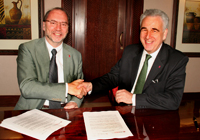
UNAIDS Executive Director Dr Peter Piot (L)
and Michel Kazatchkine, Executive Director
of The Global Fund to fight AIDS, TB and
Malaria (R) after signing the Memorandum
of Understanding. Kampala, Uganda on
June 3 2008.
Photo credit: UNAIDS/M.Mugisha
UNAIDS* and The Global Fund to fight AIDS, Tuberculosis and Malaria signed in Uganda a revised Memorandum of Understanding which renews a commitment for a coordinated response to AIDS and it serves as an umbrella framework to strategically guide their partnership to strengthen support to national AIDS responses.
The development of the present agreement, which has been revised and approved by the UNAIDS Programme Coordinating Board and the Board of The Global Fund, is based on an analysis of the current situation and a clear definition of the complementary roles of UNAIDS and The Global Fund.
Through this Memorandum of Understanding, The Global Fund and UNAIDS will collaborate to strengthen the global response to the AIDS epidemic and to accelerate progress towards universal access and the Millennium Development Goals (MDGs).
The current agreement focuses on three core activity areas:
1.- Strategic analysis and policy advice
2.- Provision of technical support
3.- Monitoring and evaluation.
Therefore, by signing this agreement, they intend to improve national AIDS responses by financing evidence-based country proposals, providing technical support to countries, support development of National Strategic Plans, improve M&E systems or build capacity of national stakeholders.
The overarching objectives upon which this agreement was developed are:
- To move towards achieving universal access to HIV prevention, treatment, care and support by 2010
- Empowering inclusive national leadership and ownership
- Improving aid effectiveness through financing national plans, consolidating grants, and defining shared monitoring indicators with major partners
- Increase advocacy and partnerships to ensure high level political support and a multi-sectoral approach for a comprehensive response to AIDS.
*The term UNAIDS refers to the Secretariat and its ten Cosponsors. The engagement of UNAIDS cosponsoring agencies with The Global Fund Secretariat, however, is not limited to the provisions of the present Memorandum of Understanding and not all Cosponsors are necessarily involved in every and all UNAIDS activities covered by this MoU. UNAIDS Secretariat and relevant Cosponsors will develop in partnership with The Global Fund follow-up operational arrangements under the framework of this Memorandum of Understanding.
UNAIDS and The Global Fund sign cooperation agree
Partners:
The Global Fund to Fight AIDS, Tuberculosis and Malaria
Feature stories:
UNAIDS pledges to help ‘make the money work’ for Global Fund (27 September 2007)
Global Fund Replenishment meeting opens in Berlin (26 September 2007)
UNAIDS helps secure grants in the Middle East and North Africa (13 December 2006)



